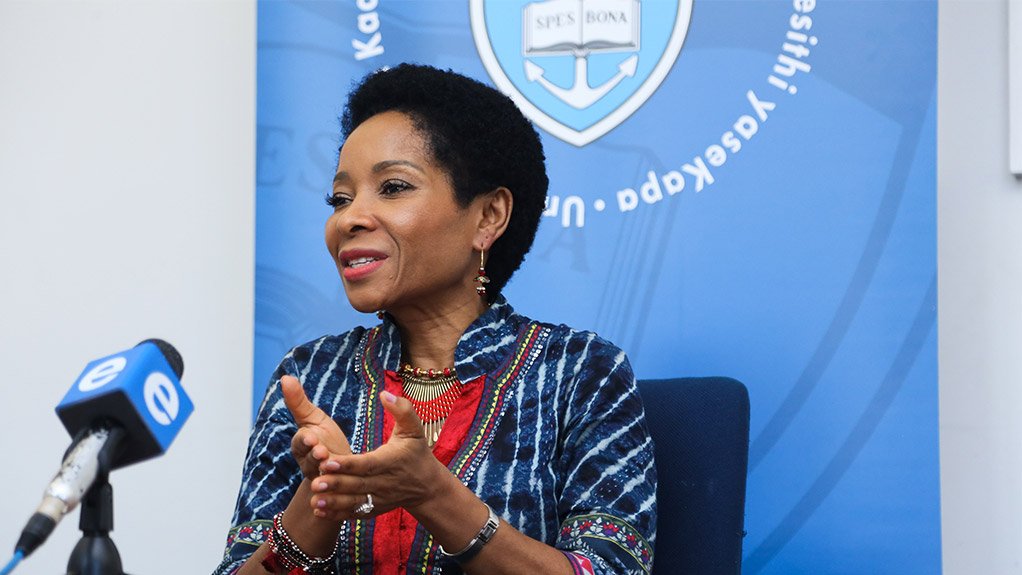The former vice-chancellor of University of Cape Town (UCT), Professor Mamokgethi Phakeng, used race and racial difference as a "weapon" to abuse colleagues, an independent panel has found.
A report released by retired Supreme Court of Appeal president, Judge Lex Mpati, and his panel on Wednesday reveals in shocking detail how Phakeng bullied and intimidated colleagues, used race to divide, and claimed she was the victim of plots and conspiracies to get rid of her.
"The most troubling aspect of her leadership was the divisive way she used race and racial difference as a weapon in her interaction with almost everyone in UCT, regardless of their position," the report finds.
"Her 'crass' obsession with race, as [former council chair Sipho] Pityana described it, became worse, not better, with time. It became increasingly difficult for leaders and staff to attend meetings with her as she brooked no disagreement and caused distress to those affected."
The report said that Phakeng appeared to believe that the criticism was aimed at undermining and victimising her because she was a "small black woman" as she frequently described herself.
The report said, "She also appeared to encourage racial division."
The scathing 179-page report said that Phakeng insisted she was the only "real black person in the executive because she had kinky hair, dismissing the claims by others who identified themselves as black because they too had suffered racial discrimination in the past".
The report also added that Phakeng had openly said that there were too many coloured and Indian people in executive positions.
The former deputy chairperson of council of UCT until March 2020, Debbie Budlender, gave evidence to the panel and said: "[A] lot of it was harping on race, so that people who weren't African were made to feel that they were tramping on toes all the time."
Budlender said Phakeng made racialised comments regularly to belittle and humiliate.
One instance that stood out and left the panel shocked was the evidence of a senior member from human resources. She recalled a conversation with Phakeng which she [the HR official] prefaced with "As a black person…."
She had not gone further when Phakeng interjected, "[Y]ou're not black… you don't have hair like me, you don't smell like me, you don't look like me and you don't taste like me."
The report said: "Apart from being offensive, the interjection left the witness wondering what right Phakeng had to allocate a racial identity to her."
The report added that Phakeng was particularly hostile to the former deputy vice-chancellor for transformation and student affairs, Professor Loretta Feris.
Feris was one of many senior UCT academics who left the institution because of Phakeng.
Phakeng had made a point of referring to Feris as a coloured person, and not black, despite Feris's objection, she testified to the Mpati panel.
"We also had an early disagreement on the issue of racial identity. I asked her not to refer to me as coloured, that I identified as black. She told me that we are not the same black and as a result we are treated differently, especially in the Western Cape," Feris told the panel.
The relationship between Feris and Phakeng deteriorated even further after an incident in November 2017 where Phakeng had apparently become "enraged".
"A witness described Phakeng's behaviour as 'ranting' incoherently, making a slew of accusations, personal attacks and racially charged accusations at some people, but aimed particularly at Feris. Feris left the meeting in tears," the report said.
Former UCT vice-chancellor Max Price told the panel about "the personality issues" he encountered with Phakeng.
"[S]he displayed the traits of what I think of as narcissism. She responded to any suggestions as if they were a personal attack. She felt there were conspiracies to discredit her and interpreted adverse events or comments as part of the conspiracy," he said in response to questions by the panel.
Phakeng's supporters in council, like Dr Lwazi Lushaba and Professor Elelwani Ramugondo, attempted to discredit the idea of an independent inquiry.
Lushaba falsely calls the decision a "racist attack" against Phakeng and former council chair Babalwa Ngonyama.
Ramugondo said: "What was happening to three black women, Ngonyama, Phakeng and [deputy council chair Pheladi] Gwangwa, was an example of institutional racism."
The panel found there was no evidence to support these allegations.
The panel found that the previous council chairperson Pityana failed to take more decisive steps to discipline Phakeng or terminate her contract.
"The panel considers that Pityana and his council neglected their fiduciary duty to UCT by failing to take reasonable steps to discipline the vice-chancellor or terminate her contract," it said.
New council chairperson, advocate Norman Arendse, apologised "unreservedly" on Wednesday to those staff members who suffered at the hands of Phakeng.
She left UCT in March with a golden handshake of R12-million.
A panel was constituted last year following allegations that Ngonyama had supplied false reasons to the UCT senate for the early departure of Professor Lis Lange, who was the deputy vice-chancellor for learning and teaching.
EMAIL THIS ARTICLE SAVE THIS ARTICLE
To subscribe email subscriptions@creamermedia.co.za or click here
To advertise email advertising@creamermedia.co.za or click here











